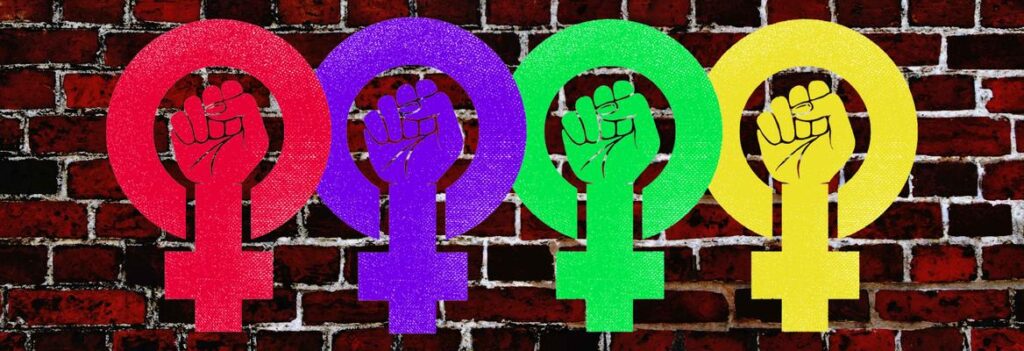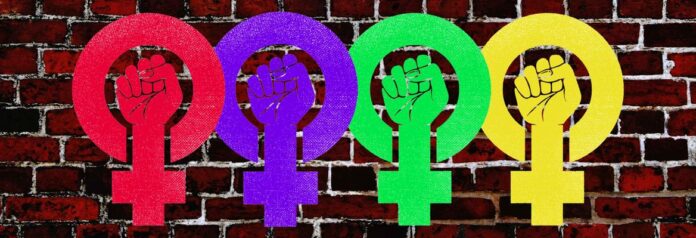Ahoy, Nigerian yet-to-be feminists, confused feminists, and fanatics! If you’re looking to get your groove on feminism, then you’ve come to the right place! Remember na di same hot water wey dey make egg hard, na im dey make potato soft.

Anyways, we’re here to discuss the concept of feminism, the newest weapon in the Adam vs Eve battle. Gone are the days when men were the undisputed kings of the hill; what a man can do, a woman can do better has evolved to more than just a saying. It is now fact. It is now reality. Women are crushing it, dem no wan gree, and they have employed the help of feminism to help plan their tactics.
However, feminism is not all most people say it is. Misconceptions portray it as a fearsome general, when in reality it is not. In fact, it is agreeable to both parties, if only they will get their heads out of their exterior ends and apply common sense.
What’s All the Hype About?
Feminism is the effort to ensure that all women are afforded the same rights, and respect as men. That’s it, really. No addendums, no hidden meanings. It is simply a movement that seeks to end discrimination and oppression of women and identify and address the social, political, and economic issues that disproportionately affect them.
Can you see now why I said all it needs is common sense?

Omo! This subject has been controversial for centuries and is still as much a hot topic in today’s world. Everywhere you turn there’s something said about feminism, whether it’s in the news, on social media, or in everyday conversation. The movement is one that is growing and inspiring more women to stand up for their rights and challenge patriarchy.
However, just like any concept, feminism has been twisted in the most dreadful ways to suit the user’s purpose. It is often attacked and intentionally misunderstood in Nigeria (and abroad) by both s3xes.
This is why we’re here to give you the super story with facts. It’s really not as complicated or intimidating as it sounds. So grab a cup of your favorite beverage, sit back and relax as we cruise into the world of feminism!
RELATED TOPICS:
History of Feminism
Omo history dey sweet shaaa. History is like the sugar in your egusi soup and the maggi in your tea… don’t look at me; that’s how I cook my thing.

Feminism goes as far back as the 18th century, when women first started fighting for their rights. The brave pioneers of the feminist movement, their efforts eventually led to the passing of the 19th Amendment in 1920, which granted women the right to vote.
During the early days of feminism in Nigeria, the movement focused mainly on gaining equal rights for women. It was not until the 1960s and 1970s that the concept expanded to include issues of race, class, and s3xuality.
This period saw the emergence of major feminist movements in Nigeria, such as the Women in Nigeria Movement (WINM), the Nigerian Women’s Movement (NWM), and the National Council of Women Societies (NCWS). These organizations sought to bring about a more equitable society for all Nigerians by advocating for women’s rights, such as access to education, employment, and healthcare.
- How to make a girl fall in love with you madly
- Love Messages To Make Her Smile
- How to Toast a Girl and Make Her Fall in Love With You
Relevance
The definition of feminism resonates with the model of humanity enabling equity and fairness. Feminism in modern society is visible almost everywhere we look. From the right to vote, to equal pay, to more representation in positions of power and influence, women have made tremendous strides in the past few decades.
Feminism has led to greater awareness and understanding of the unique issues and challenges faced by women around the globe. It has also created a greater appreciation for the contributions that women make to our society.
The role of women in society today is drastically different from what it was even just a few decades ago. Nigerian women are now represented in almost every field imaginable, from politics to science to business. They are leading organizations and pushing for real change in the world. And while there is still a long way to go to ensure true gender equality, there is no denying the impact that feminism has had in bringing about positive change for women everywhere.
READ:
Misconceptions of Feminism in Nigeria
Wahala, they say, be like bicycle, or noodles, or even Desmond Elliot. The way most Nigerian men detest feminism is super scary, as they believe that it is an attack on traditional values and culture. They argue that feminism goes against their traditional beliefs and that it threatens their power and authority. Additionally, some Nigerian men argue that feminism is anti-family and anti-religion.
In truth, however, they’re just scared of it because it bruises their fragile ego and masculinity.
Nigerian women, on the other hand, often use feminism to suit their own standards and agendas. For example, some Nigerian women may use it as a tool to gain access to resources or excuse certain behaviors.
READ ALSO: Things to Know About Polygamy in Nigeria
Exploring the Link Between Nigerian Feminism Stereotype and Mental Health
The stigma embedded in feminism in Nigeria is a funny gist for another year. Uncovering the myths and stereotypes surrounding it is an important part of understanding and appreciating the movement. From dismantling the patriarchy and challenging traditional gender roles to advocating for reproductive rights and celebrating the diversity of all genders, feminism is a beacon of hope for many.
Feminism and mental health are closely related, as gender-based discrimination can hurt mental health.
Popular Feminists In Nigeria
Renowned feminists in Nigeria include Chimamanda Adichie, Oluwatoyin Abiodun, Funmi Iyanda, and Joy Ezeilo. The debate and varying definitions of feminism has been raging on in Nigeria for years now. Chimamanda Adichie, a globally recognized Nigerian author once declared that “we should all be feminists”.
And, as expected, her statement ignited a lot of controversies.

Each of these women has a unique take on feminism. For example, Adichie has used humor to make her points on gender equality, often using funny proverbs and quotes. She has used her platform to highlight the importance of feminism in Nigerian society.
Adichie has also discussed the need for Nigerian men to accept and embrace feminism and the negative consequences of male chauvinism. Oluwatoyin Abiodun has been an advocate for women’s rights and social justice. Funmi Iyanda has focused on media representation of women, and Joy Ezeilo has been a strong advocate for the rights of women living in rural areas.
Challenges Feminism Faces in Nigeria
A common qualifier for a brave Nigerian feminist is “bitter & frustrated”, and the consistent trolls and bants on feminists on the Twitter space clearly show this. Nigerian feminists face lots of challenges, including discrimination and violence. This is especially true in rural areas, where women are often subject to oppressive gender roles and treated as second-class citizens.
In addition, many feminists in Nigeria face threats and repression from the government and other religious or political groups. And all of these happen because they fail to understand the concept of feminism.
Despite these challenges, the impact of feminism on the country has been significant. Nigerian feminists have been instrumental in pushing for laws and policies to protect women’s rights and empower them in their communities. They have also been at the forefront of the fight for LGBTQ+ rights and the abolition of harmful and oppressive gender stereotypes.
SEE: Domestic Abuse: Meaning, Causes, Prevention, and More
In Conclusion…
“Feminism is not a dirty word. It does not mean you hate men, or that you hate girls with nice legs and a tan. It also does not mean you are a ‘bitch’ or ‘dyke.’ It means you believe in equality.” – Kate Nash
Wetin concern bicycle with filling station? This expression used to be the general language about feminism from more than 70% of the Nigerian community. Well, it looks like right about now, we’ve concluded that feminism in Nigeria is going alive and kickin’! Please open that bicycle’s tank; I wan buy fuel!

It fights for the rights of the marginalized to be heard, and for justice and equality to be conferred. It stands up for women’s rights. We’ve seen how it has spread far and wide, from traditional gatherings to the mean streets of Lagos. Now is the time that we all do our part and make sure that women’s rights and needs are met, whether we’re in the North or South. This is whether we speak Pidgin or English. Let’s get to work, y’all!






